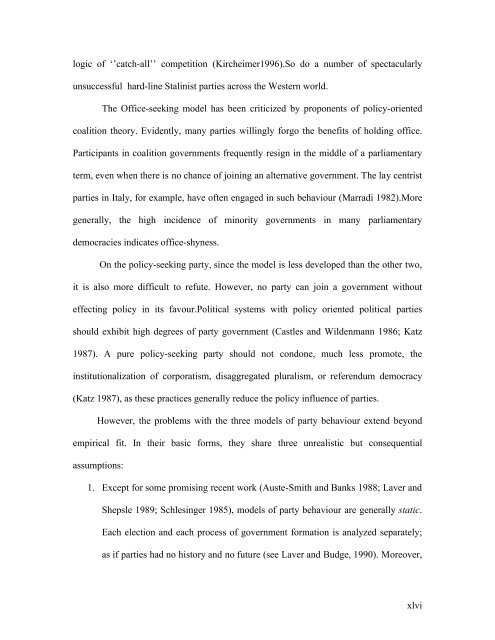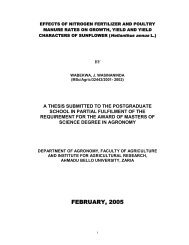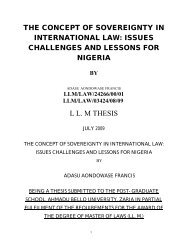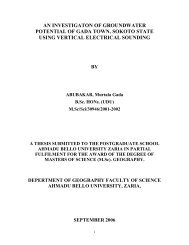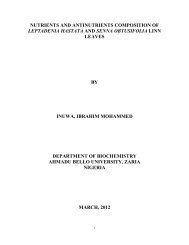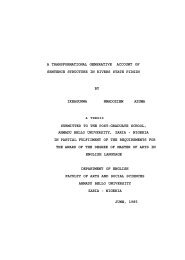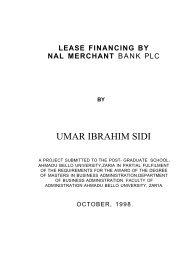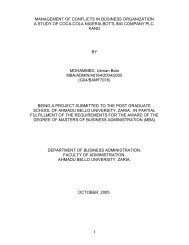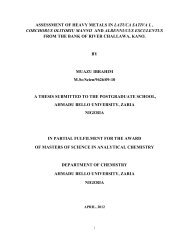- Page 1 and 2: LEADERSHIP CRISES AND DECLINE OF OP
- Page 3 and 4: CERTIFICATION This dissertation tit
- Page 5 and 6: DEDICATION With gratitude to God, I
- Page 7 and 8: INEC Independent National Electoral
- Page 9 and 10: TABLE OF CONTENTS Declaration ii Ce
- Page 11 and 12: 3.3.2 Selected Key Informants 79 3.
- Page 13 and 14: 6.2 Internal Democracy in the ANPP
- Page 15 and 16: LIST OF TABLES Table 5.1 Pioneering
- Page 17 and 18: Figure 6.6.3 Party Finance in Weekl
- Page 19 and 20: 1.1 Background to the Study CHAPTER
- Page 21 and 22: It has been acknowledged by democra
- Page 23 and 24: Senators (27) and ninety-seven (97)
- Page 25 and 26: Mozaffar et al. 2003, Randall and S
- Page 27 and 28: Chapter Three deals with the resear
- Page 29 and 30: control over leaders” (Dahl 1970)
- Page 31 and 32: opinions of scholars like Lipset, D
- Page 33 and 34: and extent of government. In other
- Page 35 and 36: Moreover, underlying these debates
- Page 37 and 38: While early democratic theory typic
- Page 39 and 40: celebrated formulation of the ‘ir
- Page 41 and 42: outside the central party bureau:
- Page 43 and 44: In the early 1940s, Schattschneider
- Page 45: game theoretical studies of governm
- Page 49 and 50: mechanism for ensuring ‘vertical
- Page 51 and 52: While they state that party leaders
- Page 53 and 54: inclusiveness criteria of “who ca
- Page 55 and 56: (Her) Majesty’s Loyal Opposition.
- Page 57 and 58: organized opposition that liberals
- Page 59 and 60: participant in that it helps the go
- Page 61 and 62: president in power and the oppositi
- Page 63 and 64: Matters stand out as some of the fe
- Page 65 and 66: problem ranging from political prob
- Page 67 and 68: eligion, region and ethnicity. Wher
- Page 69 and 70: seats following the 2006 elections,
- Page 71 and 72: where reinstituted. In Zambia, for
- Page 73 and 74: increase in the number of independe
- Page 75 and 76: national unity and economic develop
- Page 77 and 78: patronage at the time that it mobil
- Page 79 and 80: the constraint of achieving a minim
- Page 81 and 82: varied among state governments, and
- Page 83 and 84: or resuscitated ethno-regional / re
- Page 85 and 86: powers of the court are stated unde
- Page 87 and 88: interactions among group which purs
- Page 89 and 90: asic source of social evolution. Ma
- Page 91 and 92: tendency for political organization
- Page 93 and 94: A second implication/relevance of t
- Page 95 and 96: group in their own interest.Therefo
- Page 97 and 98:
(i) It involves a small sample size
- Page 99 and 100:
image of the party through its ideo
- Page 101 and 102:
Leadership newspapers. However, the
- Page 103 and 104:
asis between 2002 and 2003, particu
- Page 105 and 106:
is the ANPP as an opposition party
- Page 107 and 108:
classified. The categories for this
- Page 109 and 110:
3.5.0 Data Transformation Technique
- Page 111 and 112:
3.7.1 Inaccessibility of the ANPP O
- Page 113 and 114:
CHAPTER FOUR HISTORY, TRENDS OF POL
- Page 115 and 116:
2. to encourage the spontaneous evo
- Page 117 and 118:
when the … (educated) African has
- Page 119 and 120:
A geographical extension of the met
- Page 121 and 122:
Like its predecessors, there was ve
- Page 123 and 124:
for opinion dissent,public institut
- Page 125 and 126:
overgrown through neglected; and on
- Page 127 and 128:
3. acting as intermediary in politi
- Page 129 and 130:
can” style of politics. The emine
- Page 131 and 132:
has been strengthened by successive
- Page 133 and 134:
often exhibit the intolerance and i
- Page 135 and 136:
forming its democratic transition p
- Page 137 and 138:
The military has introduced so many
- Page 139 and 140:
4.3 A Brief Historical Formation of
- Page 141 and 142:
leader of the party started to show
- Page 143 and 144:
emergency meeting in Zaria in 1951,
- Page 145 and 146:
In October 1977, a year after the p
- Page 147 and 148:
and (4) full employment. The PRP ex
- Page 149 and 150:
The Political Bureau’s wide-rangi
- Page 151 and 152:
impose two political parties: Natio
- Page 153 and 154:
wise progression” beginning from
- Page 155 and 156:
Subsequently All Nigeria Congress (
- Page 157 and 158:
New Era Alliance (NERA) was premise
- Page 159 and 160:
Democratic Alliance (DA) was made u
- Page 161 and 162:
2. (1) There shall be multiple poli
- Page 163 and 164:
policies and strategies for tacklin
- Page 165 and 166:
(c) no political party shall receiv
- Page 167 and 168:
14. Subject to paragraphs 12 and 13
- Page 169 and 170:
The general point concerning the ef
- Page 171 and 172:
so important to retain political po
- Page 173 and 174:
Assembly. The other a de-facto alig
- Page 175 and 176:
the presidential candidate. The eff
- Page 177 and 178:
CHAPTER FIVE THE FORMATION AND TRAN
- Page 179 and 180:
On the whole, the following were th
- Page 181 and 182:
down well with Ige and Adesanya, wh
- Page 183 and 184:
as such members of the “five fing
- Page 185 and 186:
G J OFFICE OF THE NAT SOC. SEC 30 M
- Page 187 and 188:
c) Chief Levy Braide 14 Rivers Stat
- Page 189 and 190:
In Kano, APP had to contend with th
- Page 191 and 192:
5. 0 Conduct for primaries 5.1 Cong
- Page 193 and 194:
Osun: Chief Oladosu Oshimowo/Alhaji
- Page 195 and 196:
This arrangement did not go down we
- Page 197 and 198:
APP/UNPP fusion is irreversible bec
- Page 199 and 200:
Gen. Buhari made the above statemen
- Page 201 and 202:
CHAPTER SIX AN ASSESSMENT OF THE LE
- Page 203 and 204:
contributions to a functioning demo
- Page 205 and 206:
in 1999 which was ill thought and u
- Page 207 and 208:
countless campaign slogans, most ab
- Page 209 and 210:
The governors have wielded and cont
- Page 211 and 212:
Governors of Kebbi, Zamfara and him
- Page 213 and 214:
the hierarchy and the various organ
- Page 215 and 216:
As events moved in quick succession
- Page 217 and 218:
However, that did not stop Useni’
- Page 219 and 220:
and strong speculation that Etiebet
- Page 221 and 222:
All measures to provide a level pla
- Page 223 and 224:
100% 90% 80% 70% 60% 50% 40% 30% 20
- Page 225 and 226:
party candidates for purposes of co
- Page 227 and 228:
In a way, the governors preferred S
- Page 229 and 230:
When the researcher put the questio
- Page 231 and 232:
Muhammed maintained that: In punish
- Page 233 and 234:
party virtually appropriated the sp
- Page 235 and 236:
100% 90% 80% 70% 60% 50% 40% 30% 20
- Page 237 and 238:
united party since the burden is on
- Page 239 and 240:
6.3.1 The Buhari Organisation (TBO)
- Page 241 and 242:
people and enjoyed more confidence
- Page 243 and 244:
The activities of the governors pol
- Page 245 and 246:
The same thing happened in 2007, th
- Page 247 and 248:
a former House of Representatives m
- Page 249 and 250:
Hoewver, about 79% of all the categ
- Page 251 and 252:
The ruling party has used the strat
- Page 253 and 254:
Nigeria. However, it has never befo
- Page 255 and 256:
No member of the party shall hold a
- Page 257 and 258:
(b) Dissolution of INEC and prosecu
- Page 259 and 260:
phrase ‘Government of National Un
- Page 261 and 262:
No doubt, the participation of the
- Page 263 and 264:
100% 90% 80% 70% 60% 50% 40% 30% 20
- Page 265 and 266:
Party Organizational Structure Deci
- Page 267 and 268:
The South-South geo-political zone
- Page 269 and 270:
to woo voters. A clear example was
- Page 271 and 272:
dues, local fund raising by party a
- Page 273 and 274:
conduct an annual examination and a
- Page 275 and 276:
The above scenario made it more dif
- Page 277 and 278:
that huge amount of money to the PD
- Page 279 and 280:
100% 90% 80% 70% 60% 50% 40% 30% 20
- Page 281 and 282:
There is a consensus that there is
- Page 283 and 284:
Governor Ibrahim Shekarau: 2009). T
- Page 285 and 286:
generally not respected, it lacks t
- Page 287 and 288:
Policy and programme development de
- Page 289 and 290:
Part of the low salience of ideolog
- Page 291 and 292:
This lack ideological distinction n
- Page 293 and 294:
now, the situation is the same. You
- Page 295 and 296:
Bachelor’s Degree, 20.6% have Mas
- Page 297 and 298:
At the begining of the fifth sessio
- Page 299 and 300:
ANPP has never been part of these s
- Page 301 and 302:
100% 90% 80% 70% 60% 50% 40% 30% 20
- Page 303 and 304:
Governors. Because of this developm
- Page 305 and 306:
maneuvering and masterminded the wh
- Page 307 and 308:
election rigging in its various for
- Page 309 and 310:
Olajumoke were credible enough to b
- Page 311 and 312:
one led by Don Etiebet and the othe
- Page 313 and 314:
party has no evidence and the neces
- Page 315 and 316:
political patronage in political of
- Page 317 and 318:
Because the party is most times dor
- Page 319 and 320:
References Alavi, H. (1979) “The
- Page 321 and 322:
Africa.Boulder: Westview. Cho, W. (
- Page 323 and 324:
Ikoku, S.G. 1985. Nigeria’s Fourt
- Page 325 and 326:
Luckham, R. (1995), “Dilemmas of
- Page 327 and 328:
Oyugi, W., (2003) The Politics of T
- Page 329 and 330:
Stephan, A (1993) “On the Tasks o
- Page 331 and 332:
Appendix 1 List of the people inter
- Page 333 and 334:
Appendix ii b Interview Questions f
- Page 335 and 336:
Leaders hip Crises Appendix 3 Conte
- Page 337 and 338:
Appendix 4 List of Political Associ
- Page 339 and 340:
educational and other objectives as
- Page 341 and 342:
Maintenance of International peace,
- Page 343 and 344:
c. The composition of the Executive
- Page 345 and 346:
xxv. Ministers and Special Advisers
- Page 347 and 348:
viii. State financial secretary ix.
- Page 349 and 350:
v. The vacancy shall be fill by the
- Page 351 and 352:
NATIONAL EXECUTIVE COMMITTEE The na
- Page 353 and 354:
iii. Adopt party stand on controver
- Page 355 and 356:
iii. Advice the party on mass media
- Page 357 and 358:
1. The meeting shall discharge the
- Page 359 and 360:
20.4 RULES FOR THE CONDUCT OF MEETI
- Page 361 and 362:
22.3 AUDIT i. Executive Committee t
- Page 363 and 364:
v. The Executive Committee concerne
- Page 365 and 366:
iv. The National Executive Committe
- Page 367 and 368:
iii. Governor and Deputy Governor i
- Page 369 and 370:
31.2 ELECTION OF OFFICERS i. Electi
- Page 371 and 372:
Appendix 6 MANIFESTO OF THE ANPP Th
- Page 373 and 374:
Women’s Right An A.N.P.P administ
- Page 375 and 376:
products in other sectors. To this
- Page 377 and 378:
(xvii) Making sincere effort to pre
- Page 379 and 380:
Offer incentives to would-be indust
- Page 381 and 382:
d. Confronting the erosion menance
- Page 383 and 384:
Appendix 7 THE BUHARI ORGANIZATION
- Page 385 and 386:
Building of Human Capital through r
- Page 387 and 388:
(f) Enhanced welfare for n-servicem
- Page 389 and 390:
(a) To turn around Nigeria’s econ
- Page 391 and 392:
disturbing decline into a state of
- Page 393 and 394:
sector in the past three years, the
- Page 395 and 396:
8.2 Strategies (a) Resuscitation an
- Page 397 and 398:
10.1 Objectives (a) To rapidly impr
- Page 399 and 400:
(c) Pursue a high priority national
- Page 401 and 402:
YOUTHS DEVELOPMENT AND EMPOWERMENT
- Page 403 and 404:
17.1 Objectives (a) Support and enc
- Page 405 and 406:
(d) Effective management and audit
- Page 407 and 408:
21.1 Objectives (a) Support and emp
- Page 409:
(c) Involvement in public enlighten


